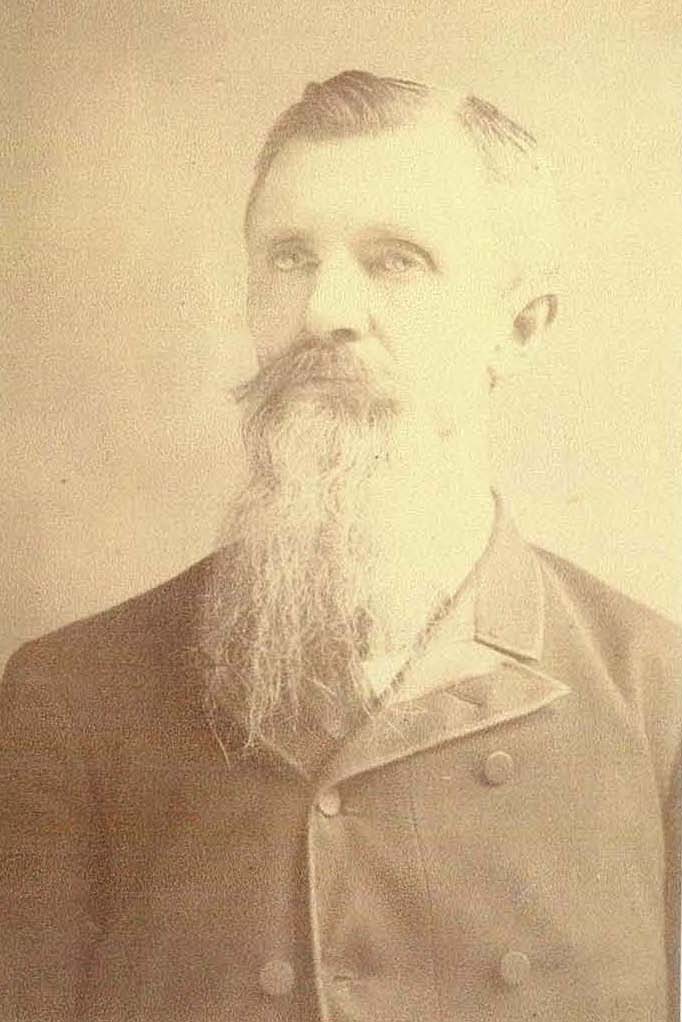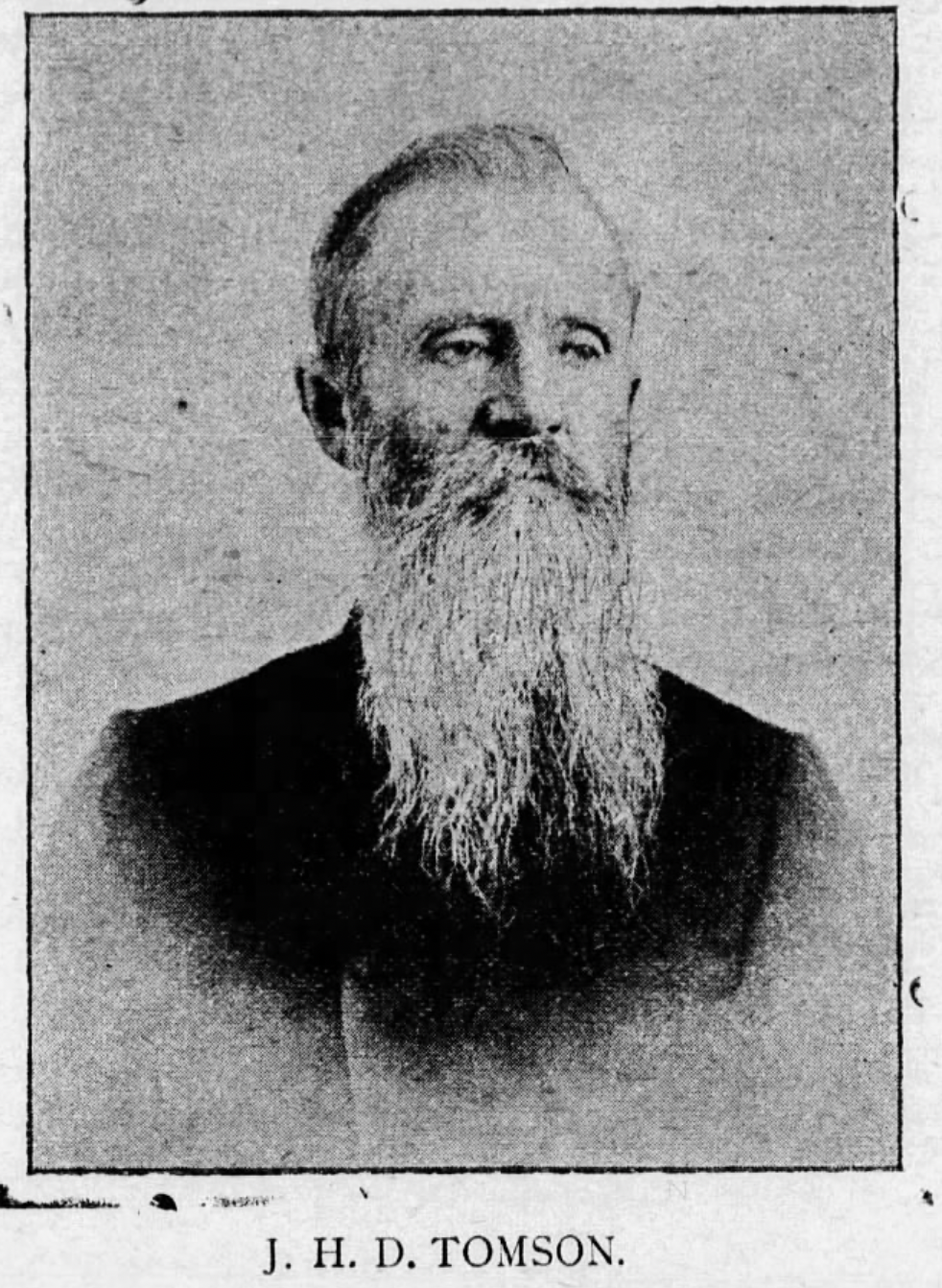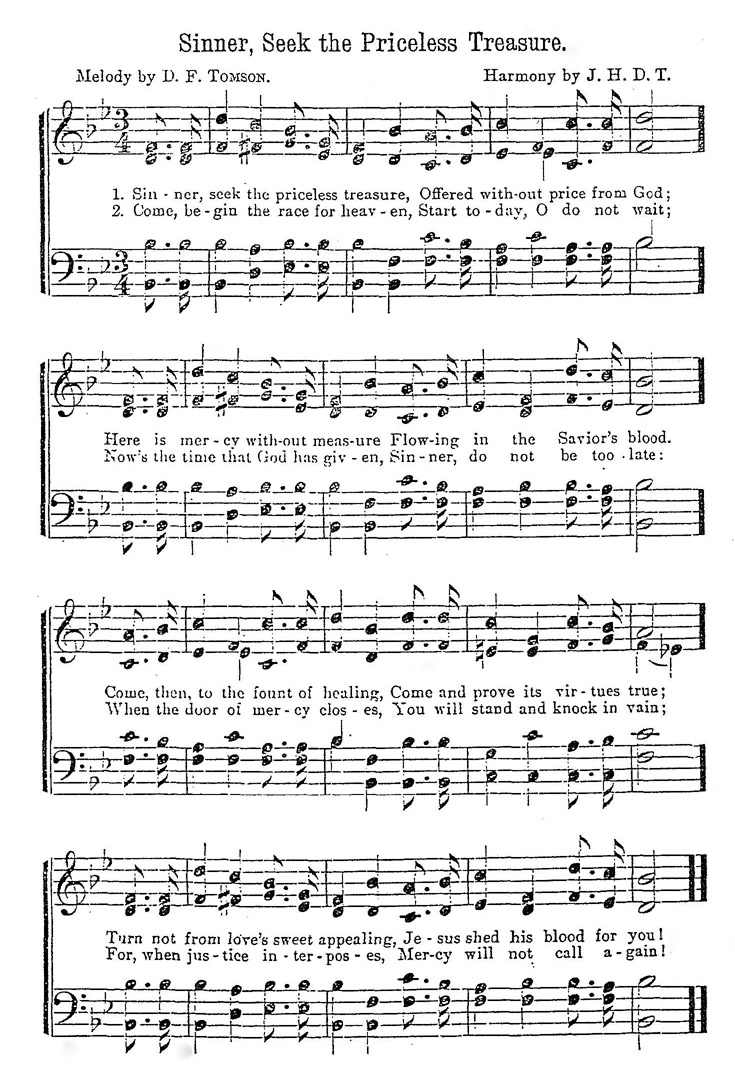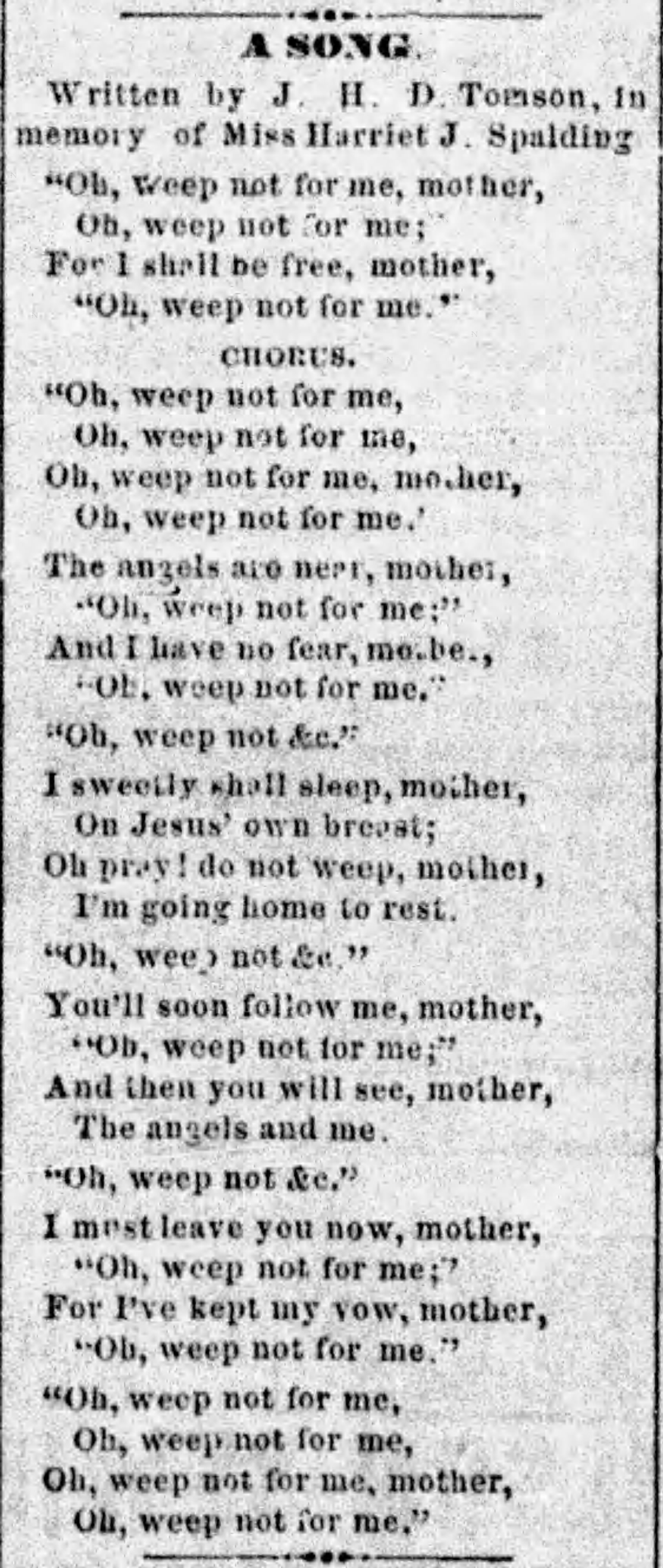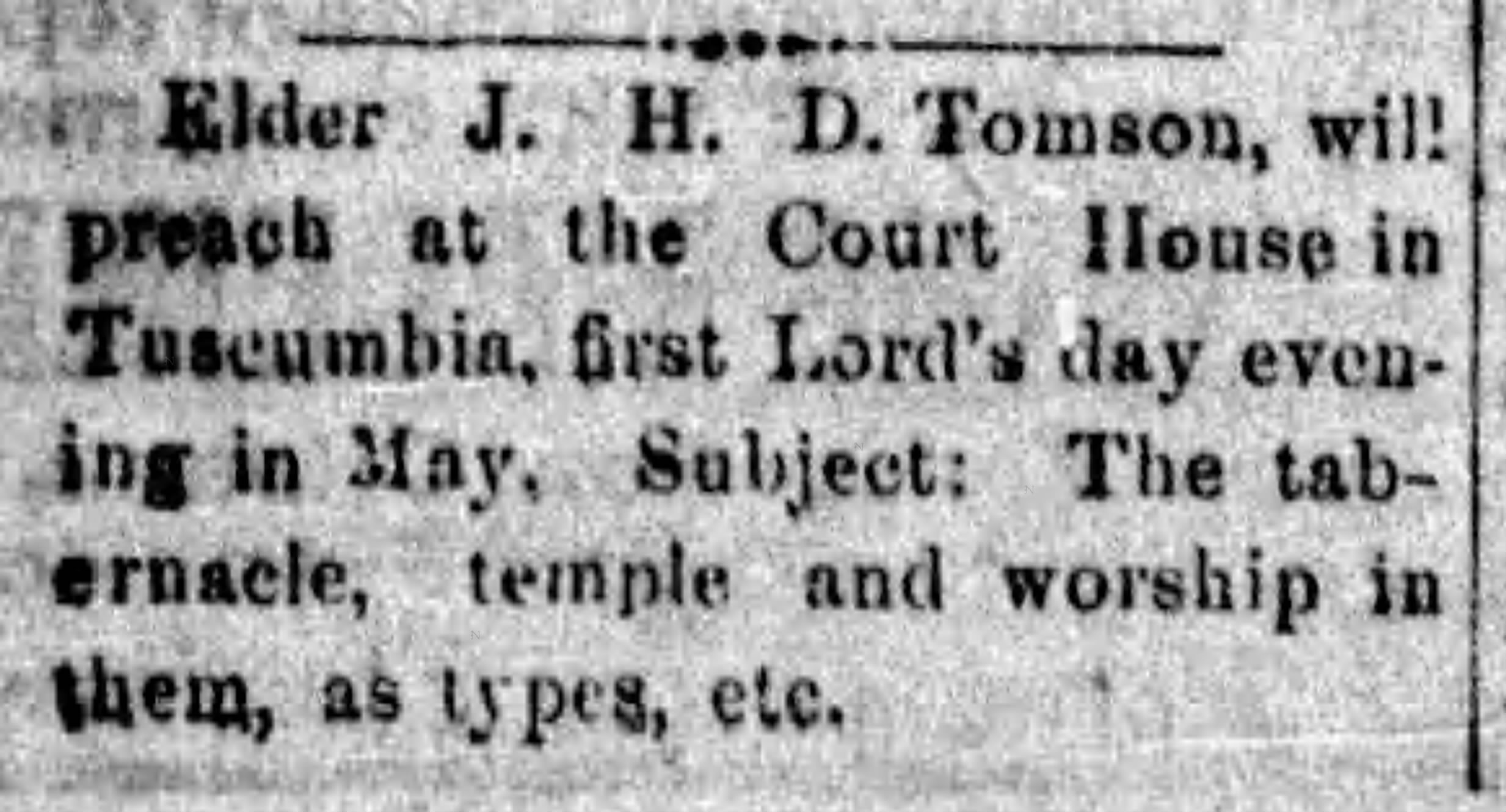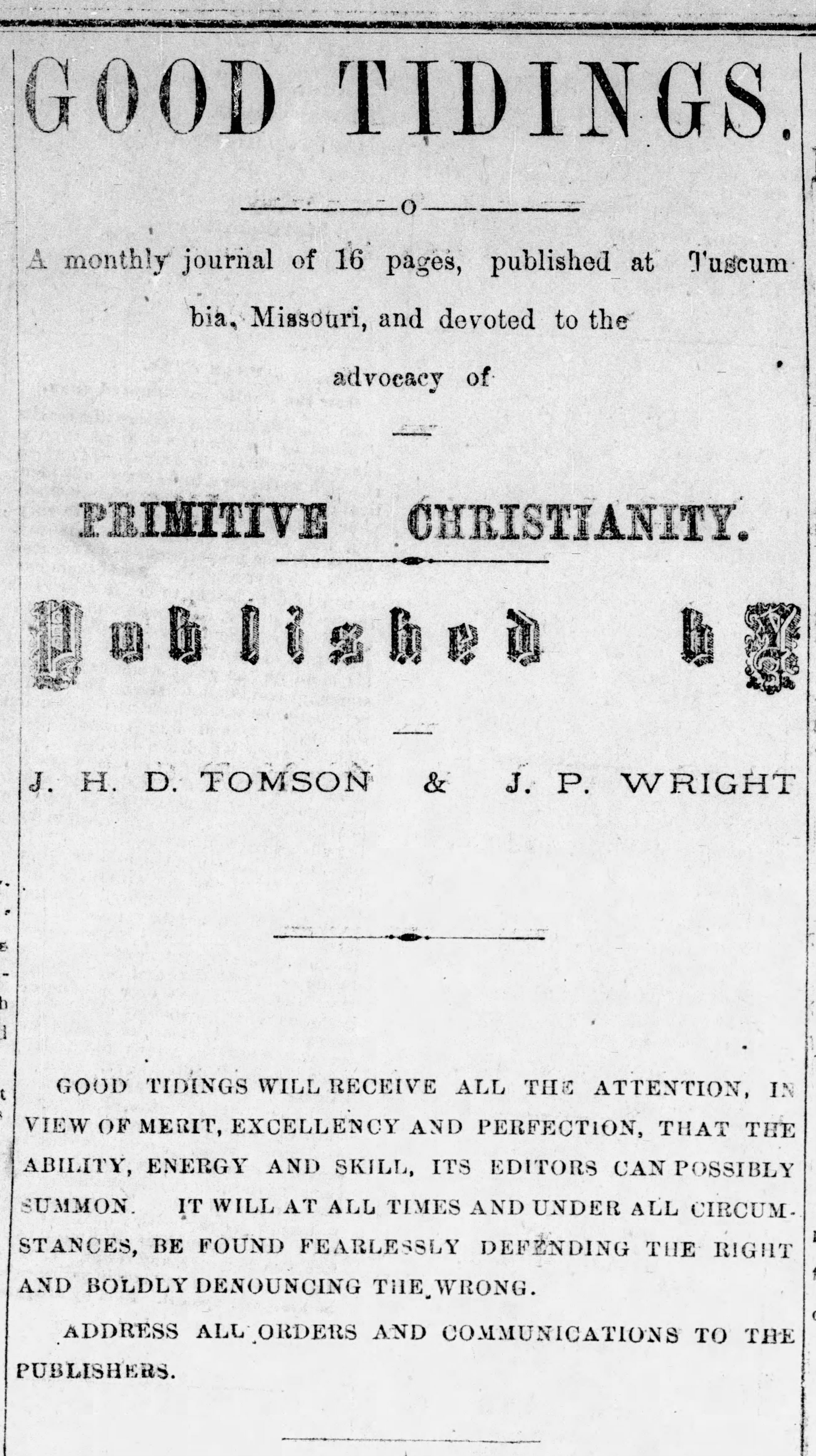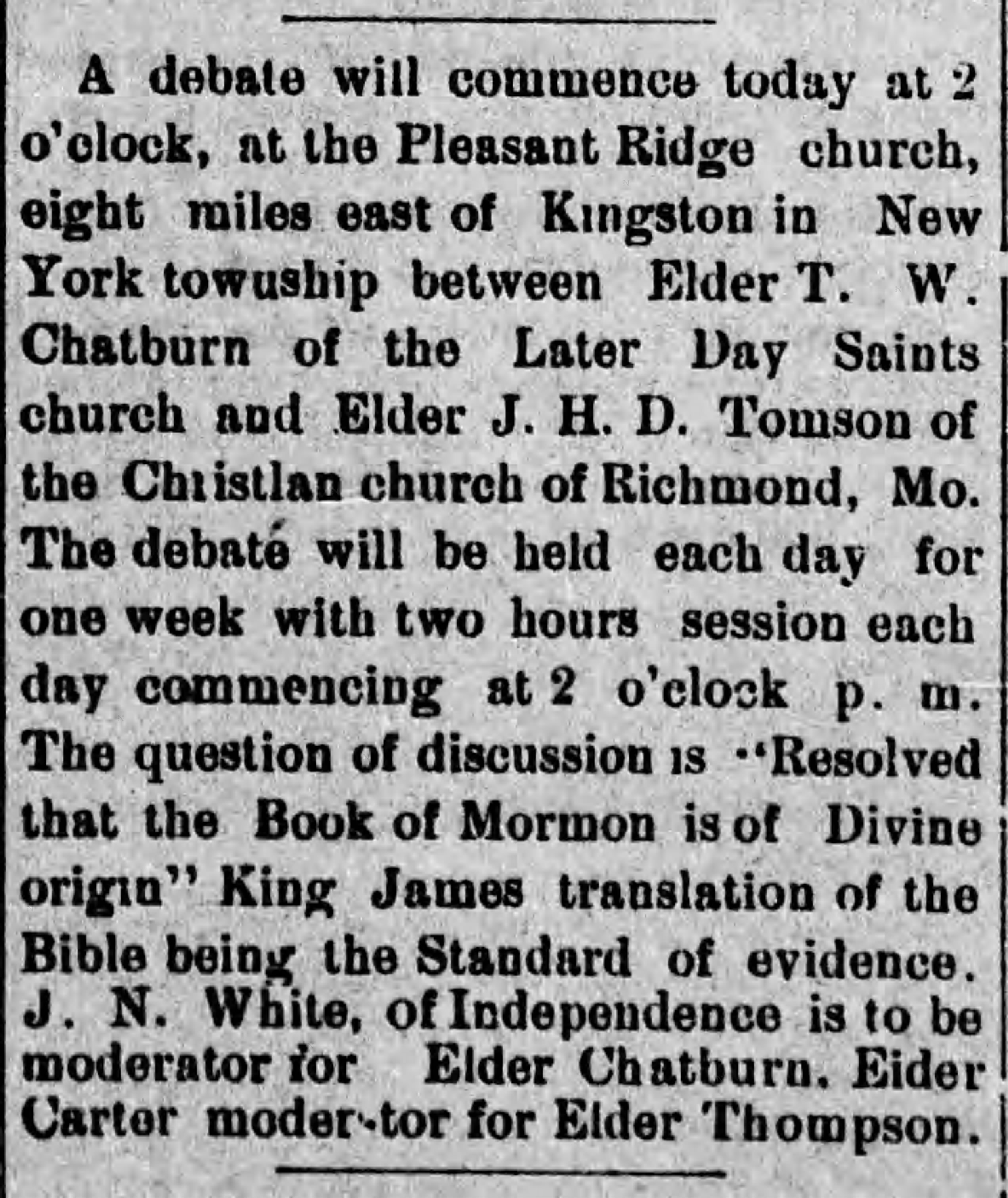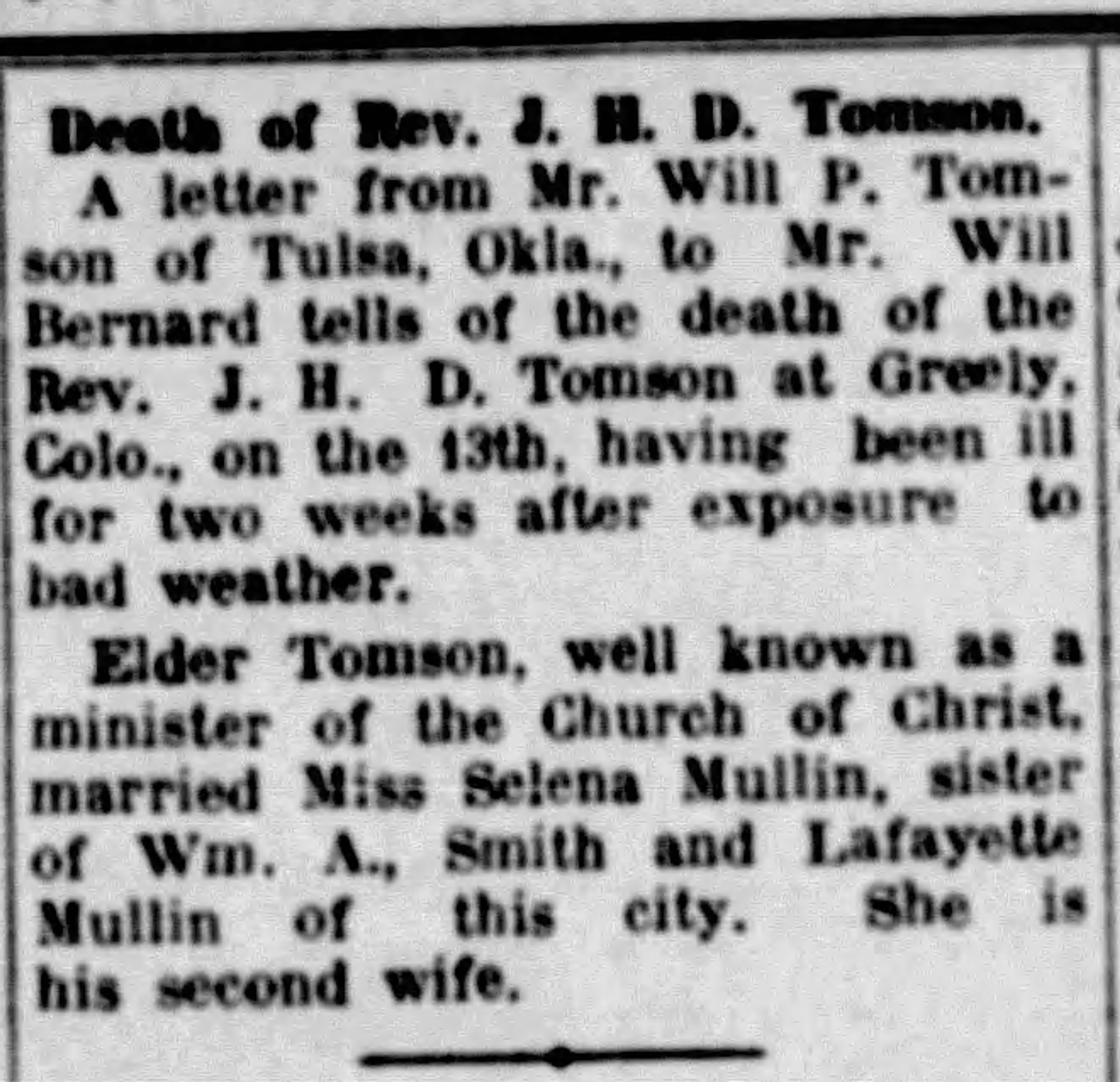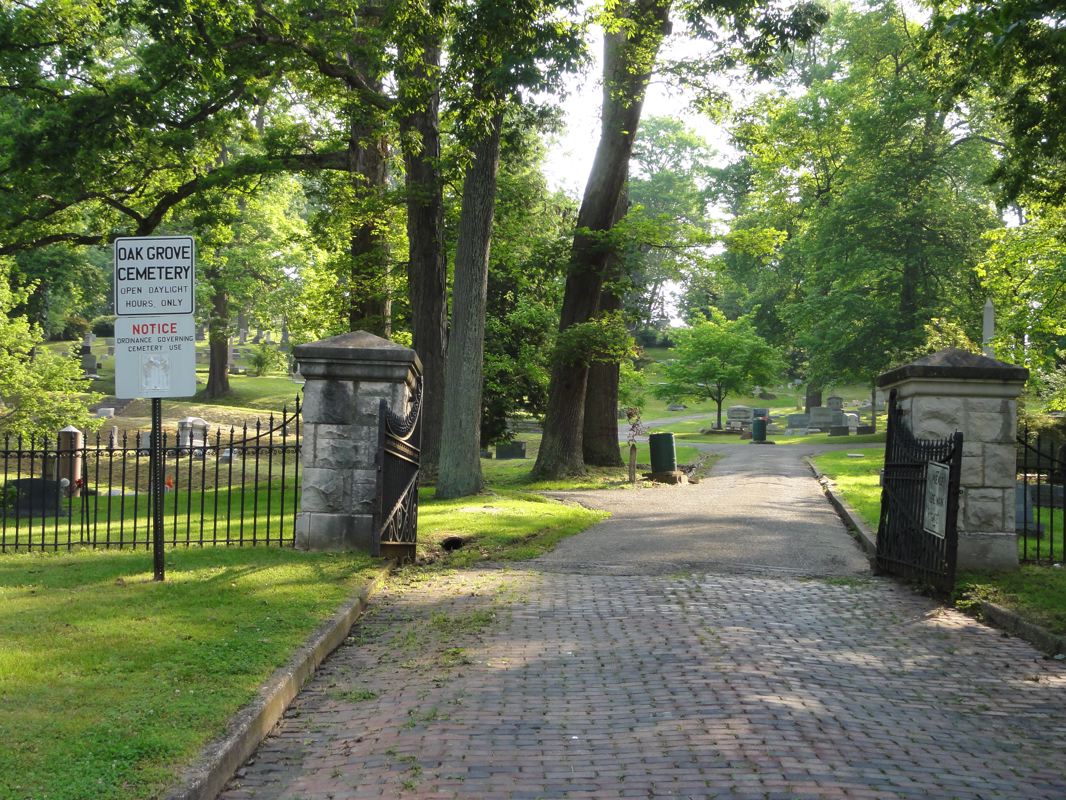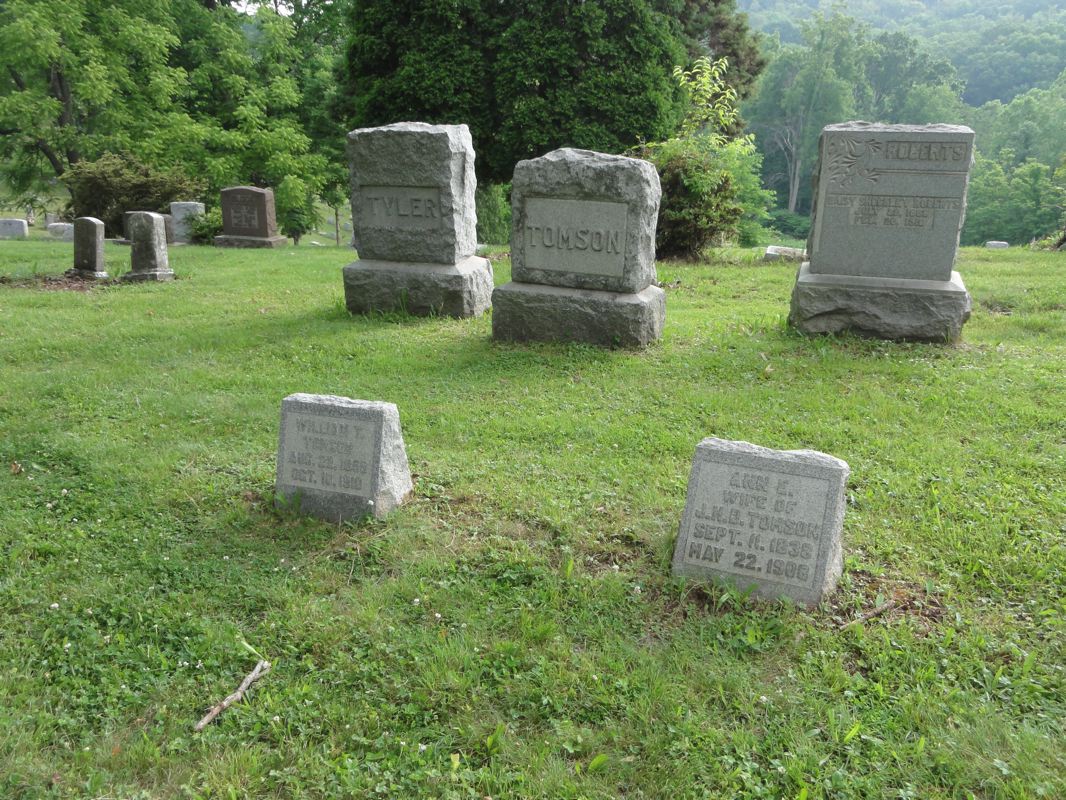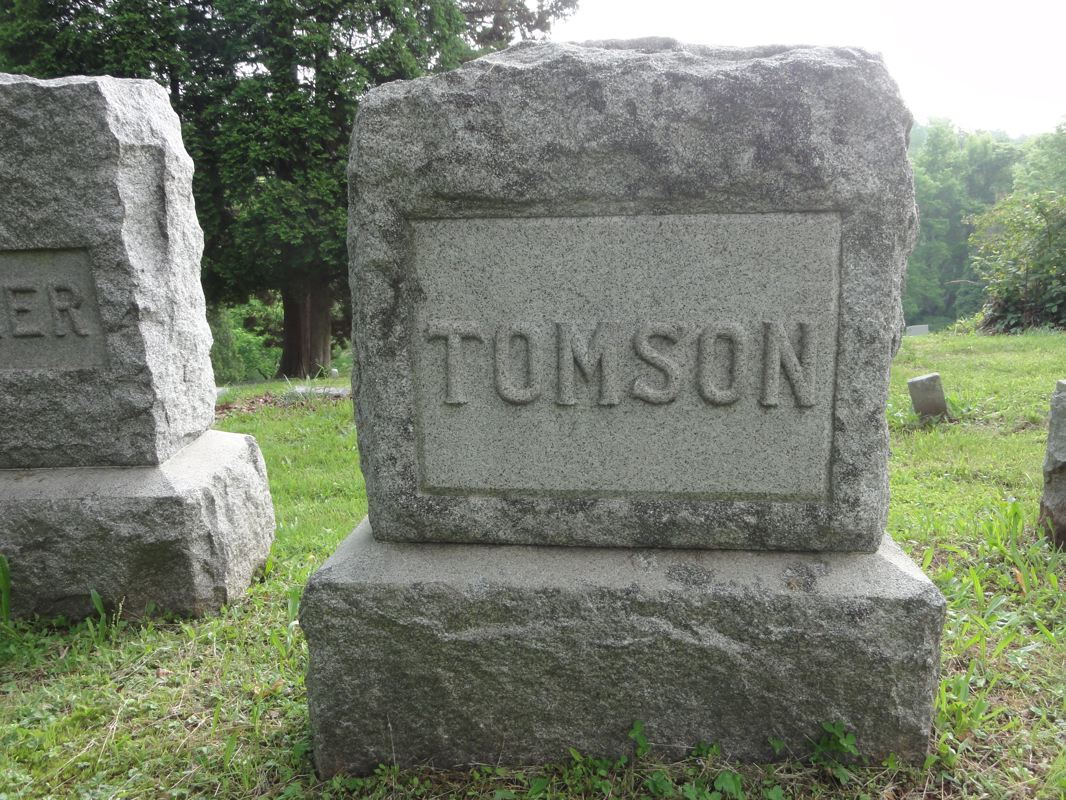Josiah Henry Dockery Tomson
1837-1913
![]()
J. H. D. Tomson
A Biography
J. H. D. Tomson was born in Tennessee, January 23, 1837, and died at Greeley, Colorado, December 13, at 10 A. M., 1913, aged 76 years, 10 months and 20 days. Fifty-seven years ago he was married to Miss Ann Rainey, and to that union were born six children of which, J. F. Tomson, a minister of the gospel, survives, and is now living in Mississippi. On May 26, 1908, we laid Sister Tomson's body to rest at Marietta, Ohio, she having died there; and on the 19th of December, 1913, Brother Tomson's body was placed beside her.
Having been left almost alone in the world, Brother Tomson married a noble, good sister from Lawson, Mo., who clung to him and aided him in health and who did all that loving hands and heart could do in his sickness; and who, under most adverse circumstances, succeeded in bringing his precious body from Greeley, Col., to Marietta, Ohio, where Brother Tomson wished to be buried, but could hardly see how that was to be accomplished. May God bless Sister Tomson for the noble part she performed and the sacrifice she made.
Brother Tomson was a faithful, fearless minister of the gospel for forty-three years, contending earnestly for the faith through hardships, privations and poverty. He was a dear lover of music, both insturmental and vocal, but did not believe in having the instrumental in the worship, neither did he believe in having the church split up into societies (factions). He refused as much as $1,500 per year from such a church, and likewise, like Moses, he chose to be with the children of God and suffer affliction, rather than to enjoy the pleasures of sin for a season (Heb. 11:24), hence he worked with the church of Christ at about one-third of the above amount the following year.
He would sometimes say from the pulpit, "If I were to give way to my feelings I would fill this house with music (mentioning the finest of instruments), but what is my feeling compared to God's word?" He well knew he must obey God's will if he would inherit eternal life; and being a good scholar, he knew that instrumental melody is not authorized to be used in the worship of God. He was particular not to sing a song that was contradictory to God's word, saying, "What is the difference in singing a falsehood and telling a falsehood?" Being the author of Gospel Melodies, he was careful that all songs contained therein (for worship), were in harmony with the word of God.
He loved his brethren dearly, always striving to do all he could to edify and build up, and to keep the unity of the spirit in the bond of peace, that the brethren might all be of one mind, all speaking the same things. He was patient and forbearing, never holding malice in his heart toward any one, no difference how they abused or persecuted him; often saying, "If ye have aught against any when—ye stand praying, forgive;" and would pray for mercy on them, like his Saviour, as if he thought they knew not what they do and when better informed they would see and do differently.
The last three years and eight months of his life were spent in the mission fields of the West, where hardships and privations were many; often missing a good opportunity to preach the gospel, as board and house rent would have to be paid, and finances would not permit. His last meeting was held in the humble home of Brother and Sister Mortenzen, of Bennett, Col., on the plains. His last sermon was on Keeping the Lord's house, Breaking Bread on the First Day of the Week; and it is but natural for us to hope that the dear ones who heard that last sermon will ever remember and never neglect.
The great scholar, poet, and musician that he was, he did not seek prominence, laudation and praise, but chose the lowly walks of life and endeavored to preach the gospel to the poor, from place to place, in many States. He was quiet, humble, and unassuming, yet dignified and scholarly in private life, and on the public rostrum, thus lifting many a one above the low and groveling things of the world. He was a useful man, and will be missed by many. By some he was thougt to be somewhat peculiar in some things, and too patricular at some points, but the writer does not presume to say yea or nay; yet we can say that he held to his positions conscientiously, and just not just for effect or show.
He wrote much of value to the various church papers, and served quites a while as Querist Editor for the Christian Leader, and was rendering similar service for bro. E. C. Fuqua's paper, the Word of Truth, at Greeley, and we could not but see the love of Bro. and Sister Fuqua for the dear old soldier who fell at his post, and for the heart-broken wife, in the beautiful wreaths that covered the breast of our fallen comrade.
To know Bro. Tomson well, was to love him much. In his home he was good and true; his praises could not be spoken; but with the poet we must say:
"A voice we loved is stilled,
A place is vacant in our home,
That never can be filled."
In the absence of Bro. C. E. Fogle from Marietta, the writer of these lines was called to conduct the funeral services, which was the first to be held in the new church house; and we could but wonder who would be the next to follow. Bro. Tomson labored quite a while with the Marietta congregation, preaching and giving instruction in vocal music, and was held in hight esteem by the brethen, man of whom attended the funeral and mingled their tears with those of one sad and lonely mourner, Sister Tomson, who, though broken-hearted, bravely looks forward to the coming of the Lord, when all the faithful will receive a rich reward.
-C. D. Moore, Paden City, W. Va.
Webmaster Note: No source material was available from the copy of this biographical sketch. Thus, we do not know where it was published. Perhaps in the Christian Leader. It is part of a folder of information given to me by Alta Davidson in February 2008, on the history of the New Hope church of Christ in Middleton, Hardeman County, Tennessee.
![]()
REVEREND JOSIAH H.D.THOMSON:
THE PULPIT AND THE PRESS
My father, Tennyson Wright of Colorado Springs, CO., first stirred my interest in Rev. Josiah H. D. Thomson, a son of Thomas Arrington Thomson. I knew of Josiah's involvement with various congregations in Missouri, but when I came to live in Oregon I discovered that he had lived in Oregon, and had accomplished much in evangelism.
Rev. Josiah H. D. Thomson was instrumental in establishing and developing church congregations all over Missouri. Many of these congregations are still meeting. There is presently a congregation in Eldon, Missouri, where once Josiah seemed to have been headquartered. That congregation is not the one he was involved with, but the "instrumental music congregation" in Eldon does have a trace of its history back to his time. Although he was not in favor of instrumental music in the worship service, some of those he worked with began using such music later. He also helped to establish the congregation in Eugene, Missouri. I saw his name on a register as a guest speaker for the country church at Lamine, Missouri. That church is still worshipping, and is located not far from Interstate 50 that runs from Kansas City to St. Louis.
Various church and county histories list these Churches of Christ that Rev. Josiah H. D. Thomson and his brother, the Rev. Greene Lee Tomson, ministered to at times:
Spring Garden Church, organized 1840, with Revs. Josiah and Greene L. Tomson, pastors.
Old Salem Church (now Mt. Pleasant), organized 1852, Rev. Josiah H. D. Thomson, pastor.
Olean Christian Church, organized 1870, with Thompson, pastor.
Tuscumbia Christian Church, organized 1878, Rev. Josiah H. D. Thomson, pastor.
Hickory Point Church, organized 1878, Rev. Josiah Thomson, pastor.
Pisgah Church, organized 1880, Thomson, pastor.
Brumley Church, organized 1883, Rev. Josiah H,D. Thomson, pastor.
Church of Christ, Liberty Congregation, Rev. Josiah H.D. Thomson, pastor.
All of these churches were located in Miller or Cole County, Missouri.
In other parts of the state there was a rural congregation called Old Scotland, near Jameson, that heard him preach. Included on the long list of other churches are: Kirksville, Rock Hill, Summersville, Unionville, Flat Rock, West Concord, and White Oak.
There were a number of places in Indiana where Josiah worked spreading the word of God. There is as mall country congregation not far from New Castle, Indiana, and next to it, there is as mall graveyard where he may be buried. He apparently died in Indiana on 19 December 1913, after returning there from Oregon where his wife had died and was buried. The church cemetery near this little church contains the remains of many of the Church of Christ members of that time, but I was unable to find Josiah’s grave. One day, the Lord willing, I will go back and search again.
As near as I can determine, Josiah came west because of pressure in the mid-west over his stand on slavery. He was actively opposed to the practice, and very vocal about it from the pulpit. Many of the church people in the congregations of the Church of Christ during the pre-Civil War days were also against slavery, but felt that it was more of a political issue, and should not be continually preached pro or con from a church pulpit. The pressure to stop talking about it was a discouragement to Josiah, so he headed West where the issue wasn't in the forefront.
Prior to the move west, Josiah had not only been active in the spreading of the Gospel, but he had become a composer of music, especially sacred songs. Together with his son, William Thomas Thomson, and with help from Daniel Frazer Thompson, a collection of their hymns were published under the title of Gospel Melodies.
Josiah published The Gospel Proclamation, a religious a religious monthly with James Pinkney Wright; later the tabloid was changed to Good Tidings. Later the two cousins published The Miller County Vindicator, a weekly, at Tuscumbia.
During the Civil War he was a guard at the Missouri State Penitentiary.
Mary Ann (Rainey), Josiah's wife, died here in Oregon, and I have tried in vain to find her grave. During the time of the wagon trains—and their westward movements—there were many Church of Christ members involved. Most of them seemed to have headed Northwest rather than down to California. Josiah and his wife were among those going north.
During the early days of settling Oregon there were several Churches of Christ established—many of them righ there in the Willamette Valley. Josiah had something to do with that, but try as I may, I have not been able to find much information on the subject. Apparently, those folks were not much on keeping records, and when they died out all of the information was lost. I have been told of a large congregation at one time in Albany, Oregon, but no trace remains of it now. Oregon people seemed to have been very independent, and after arriving here as settlers, they may not have done much about bringing younger folks into keep things going. As the original group got older it simply died out. That is the only plausible answer I have arrived at so far.
There is a little country congregation in Porter, Washington. A mere handful of people still meet there, but know nothing of the church's history that far back. It would have been in the middle of a lumber camp at that period in time, as would most of the groups established in Oregon or Washington.
Mary Anne, Reverend Josiah's wife, died in Oregon, and not long after that, Josiah returned to the state of Indiana. He missed her a great deal, and didn't seem to have the 'zip' he had when she was living. No doubt their experiences in Oregon had been rugged ones.
It is my understanding that in his later years, Josiah worked to influence his father, Thomas Arrington Thomson, into becoming a member of the Church of Christ. Thomas Arrington had been indecisive all of his life about which church to join, and not too long before he died, he was baptized by immersion into the church of Josiah and Greene Lee, his minister sons. Josiah has been referred to as the "Walking Minister of the Ozarks."
-Source: Lee Wright, The New Hope Papers, pages 254-256
![]()
A Hymn Of J. H. D. Tomson
NOTE: This hymn is from the Gospel Melodies, a hymnal printed about the turn of this century. The songbook was printed by the Rev. Josiah Henry Dockery Tomson, a widely known evangelist. The book was used by members of the Church of Christ and those of the Disciples of Christ. The harmony was written by Rev. Josiah Tomson, a son of Thomas Arrington Tomson, and the melody was by Daniel Fraser Tomson, his brother. There were 60 hymns in this church songbook that were by Tomson descendants, and they are being copied by this author for future printing.
Source: The New Hope Papers, page 180
Web Editor's Note: A number of years ago, I received a package in the mail from a friend in Florence, Alabama. Alta Davidson and her husband Jerry, have long been connected to Heritage Christian University. Jerry Davidson was one of my teachers when I was in college there. Alta sent me some information she had been saving for years about her church home, New Hope Church of Christ in Hardeman County, Tennessee. At the time, the Thomson/Tomson name meant very little to me. However, over the years I have come to greatly love this name and this family. My good friend, Tom L. Childers is the preacher at New Hope. It is one of the earliest and nearly oldest churches of Christ in West Tennessee. Many of the Thompsons are buried in the old cemetery there. Josiah was one of the family, and it was my privilege to visit his grave last summer while on a restoration trip with Tom in May, 2012. Tomson's grave was one of the last on our trip. We were both deeply disappointed at the fact that Anne had a monument, but no one had ever put a marker there for Josiah. See the photos of the site we found below. Perhaps someday a marker for J. H. D. Tomson can be placed in the cemetery in Marietta, Ohio.
The papers Alta gave me, I now refer to as The New Hope Papers. The song, and story above comes from that collection.
Gospel Melodies
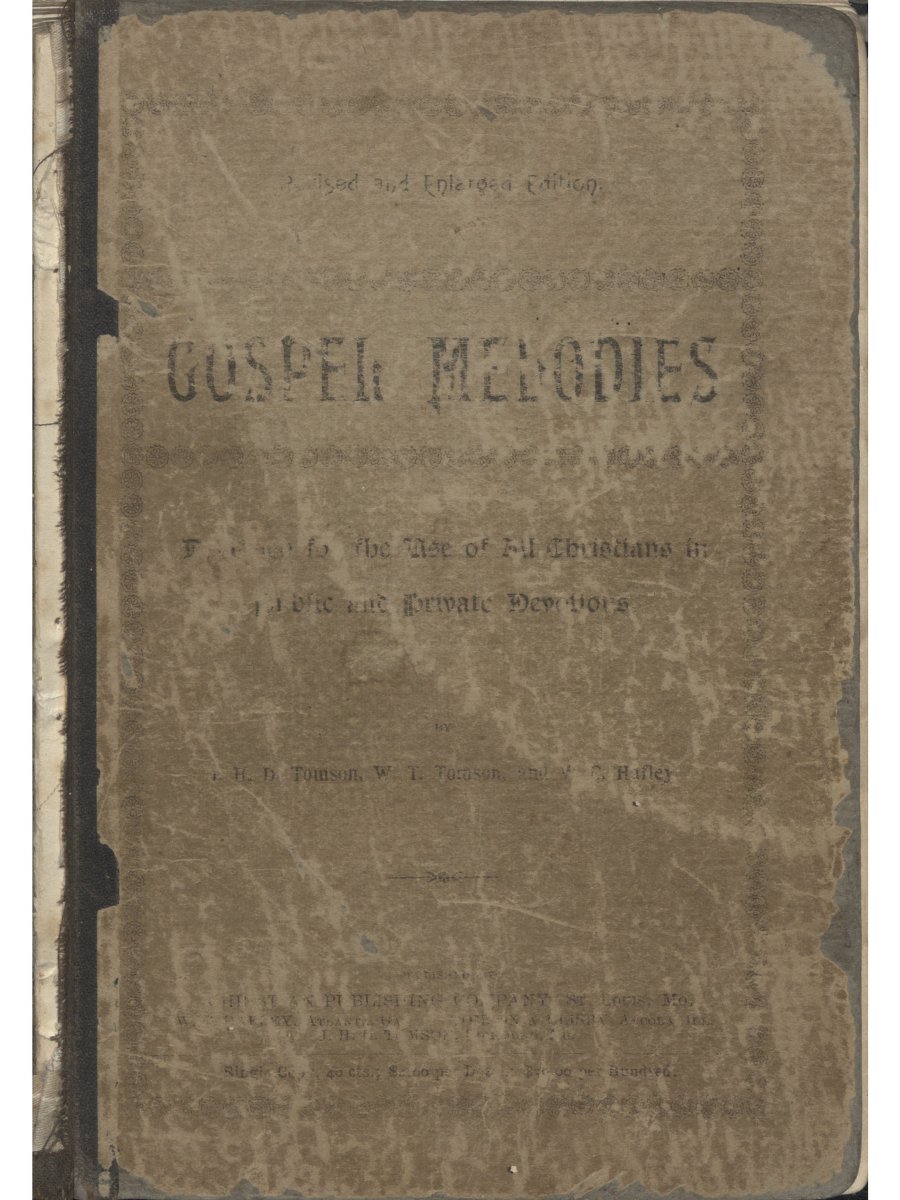
Gospel Melodies - Free Download
![]()
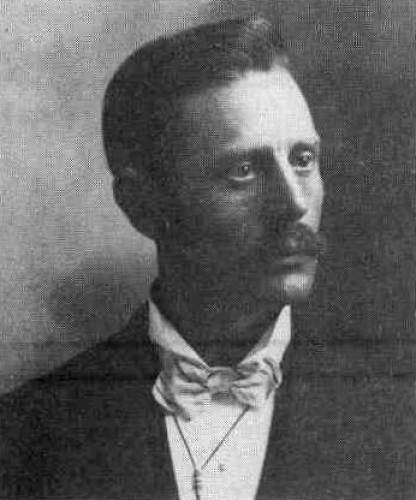
William Thomas "Tommie" Tomson
Writer Of Christian Music
In Memoriam
William Thomas Tomson, son of Elder J. H. D. Tomson, and Anna E., his wife, died suddenly at Washington Hospital, Marrietta, O., under the care of Dr. Cunningham, who drugged him and operated on him for appendicitis, and finding nothing the matter with his appendix claims that an abscess in his stomach had broken, making a hole through his stomach as large as the end of his finger, through which pus and other poison had oozed into his body to the amount of a half gallon or more; and, had he been with him when he was first taken, knowing what his illness was, that he nor any other doctor or surgeon could have saved his life. He holds that his bowels were inflamed until they were of a red or pink color, and that the lining of his stomach and the bowels were in a condition of peritonitis, and for these reasons there was no hope for his life from the time the abscess broke. This seems very strange to me, and others who were recently informed by himself of his good health. Does it not seem strange that he would write me on the 12th of October of his good health that that abscess would kill him in less than two days after? How could a man with a half gallon or more of pus and other poison in his stomach enjoy health? Such an idea seems very unreasonable and hard for me, and others to believe, that a man could carry all that in his stomach and enjoy good health up to twenty-four hours before it broke through the stomach and emptied itself into his body; causing peritonitis, which caused his death within the twenty-four hours from the time his suffering began. If the drug and knife had not been ....(illegible)
...years, 1 month and 22 days old at the time of his death. From early childhood he had a great taste for music, both vocal and instrumental, and applied himself to the study of that science and art, with his other stoudies, but never neglected his music. He was professor of music in Orange College, Stark, Fla. in 1887 . . . (illegible)
...and himself barely escaped death. He never married again, but devoted about nine years in succession as principal of the Academy of Music at Arcola, Ill, that he, in connection with Prof. F.A. Wagner, of Potsdam, Prusssia, established in 1888, Wagner remained with him about one year. He was superintendent of the schools of the city also for some time. always giving satisfaction in reference to whatsoever he did.
He traveled and taught a while, then engaged to sell organs and pianos for the Stevens Organ and Piano Complany, and afterward became their salesman and magaer in their store, where, he had labored about twelve years up to the time of his death, always giving entire satisfaction to both employers and customers. Always the same congenial gentlemand, ready to accommodate and wait on all calling on him, and give his advice and judgment when asked byany one wishing it, about anything pertaining to music, instruments, etc.
He is the author of several of the hymns and tunes, and of the most of the harmony, of the new compositions in the Gospel Melodies; but of late years he did not compose nor teach much. He and Bro. Bosworth of the Christian Publishing Company, had intended publishing a book of anthems, but Bro. Bosworth died before the intended book was prepared. I wish to add a few of his beautifuly hymns as an index pointing to the ocndition of his heart and his soul.
A Few Of The Songs Composed By W. T. Tomson
"With hearts of sorrow, and tho'ts of care,
Thro thee, dear Savior, we come in prayer,
For thou knowest sorrow on earth below,
Thou knowest our weakness and all our woe."
"In pity look upon us now;
In meekness and penitence, Lord, we bow;
O grant us, we pray thee, thy pard'ning love,
And guide us and save us in heav'n above." (Page 10, Gospel Melodies)
Several more lines of his songs are listed in the obituary, but are illegible in this copy.
--------------
The Spot Where Tommie Lies
Dear is the spot where Tommie sleeps,
And sweet the strains which angels pour;
Oh, why shoul we in anguish weep?
He is not lost, but gone before.
We'll plant a rose upon the spot,
For Tommie dear is not forgot;
The weeping willow, too, shall wave,
And drop a tear on Tommie's grave!
The blooming roses cheer the heart,
And thoughts of meeting ne'er to part.
Revive the drooping spirits now,
So to our fate let's humbly bow.
The day will come when we shall meet,
And all our loved ones we shall greet,
and join with them to praise the Lord,
If we prove faithful to his word.
Written by his father, J. H. D. Tomson.
Note: Most of the foregoing short sketch of the life and death of my dear, beloved son was writtend shortly after his death, but sickness and other things have delayed its publication until now. The memories of thousands who were acquainted with him and knew him from childhood up to the time of his death, will enable them to say, "He was a good boy and a good man." J. H. D. T."
Source: A Memorian written by Rev. J. H. D. Tomson to his son William Thomas Tomson, who died in Marietta, Ohio.
![]()
MORE CONCERNING THE LATE J. H. D. TOMSON
J. F. Tomson
His father, Thomas A. Tomson, was born in North Carolina, and was a planter and farmer. His grandfather, Henry Tomson, was born in Maryland and was a poet, teacher, and minister. His great-grandfather, Thomas Tomson, was a soldier in the Revolutionary war, and was also a preacher. Two uncles were preachers, one (J. E. Tomson) a Methodist, and was a presiding elder at the time of his death. The other (W. L. Tomson) was a Christian preacher and labored with the New Hope Church of Christ, Tenn., forty-five years. Also one brother, G. L. Tomson, of Tuscumbia, Mo., the writer, his sin, and several cousins are preachers of the “faith once for all delivered unto the saints.”
For generations the family can trace a tendency to literary pursuits, poetry, music and religion. The Tomsons originally came to America from Parthshire, near Glasgow, Scotland. First settled in the Bermuda Islands, but later, A. D. 1634 joined the Calvert expedition and settled in Maryland on the Isle of Kent and the islands of Chesapeake Bay South, on the mainland of the eastern shore, where they lived uninterruptedly for nearly two hundred years.
Afterwards his great-grandfather, Eld. Thomas Tomson, migrated west. The great-grandmother was Elizabeth Lee, a relative of General Robert E. Lee. Henry Tomson, the grandfather, was at one time a Methodist preacher, but was withdrawn from as a heretic. He advocated immersion as the only scriptural baptism, and that Bible things should be called by Bible names. He continued to preach along Bible lines, until the restoration movement reached his section when he united with the Church of Christ, and ever continued to preach the gospel, honored and loved by all who knew him. His wife and three sons died in the Methodist faith. His second oldest son, W. L. Tomson, followed his father’s example as a preacher of the gospel. Four daughters and one son, (Thomas A. Tomson, my father’s father) were led into the light of the true gospel, by J. H. D. and G. L. Tomson, J. H. D. baptizing his father and one of his aunts, Mrs. Wm. Harrison, and probably one other.
J. H. D. Tomson was married twice, to Miss Ann Eliza Rainey, October 15, 1855; to this union were born five sons and one daughter, the writer of this sketch being the only one living. In A. D. 1858, he removed to Mo., where he spent the greater part of his life. He was married the second time to Miss Salena-Mullin, of Lawson Mo., a most excellent Christian woman. My father obeyed the gospel under the preaching of Bro. O. P. Davis, at Spring Garden, Missouri, and was buried with his Lord in baptism Nov. 30, 1863, after a thickness of ten or twelve inches of ice had been cut. I never heard my father use a by-word, or engage in foolish jesting.
During a meeting held by Bro. R. D. Hudson, under an arbor near the Hicks School House, about A. D. 1869, he preached his first discourse, from Hebrews 2: 3. In A. D. 1870, he was ordained by the Church of Christ, at Spring Garden, Missouri. He endured the life of a Western preacher, for nearly a quarter of a century—the prime of life, teaching common schools and music as a means of support. He was the author of "Gospel Melodies" and the first to correct the contradiction in the old hymn, “There Is a Fountain Filled With Blood.” He wrote the fourth verse:
“And when this lisping, stammering tongue,
Is ransomed from the grave,
Then in a nobler, sweeter song,
I’ll sing thy power to save.”
-Word And Work, March 1914, Vol. 7, No. 3, pps. 21,22
![]()
Obituary Of William Thomas Tomson
(click article to read /
also transcibed below)
The Miller County Autogram-Sentinel
Thursday, October 27, 1910, p.4
The following announcement of the death of William Thomas Tomson of Marietta, Ohio, is taken from the Marietta Daily Journal of October 14th, 1910:
The sudden death of William T. Tomson, the well known employee of the Streeper Organ and Piano Company, occurred in the Marietta Hospital this morning at 8 o’clock following an operation for appendicitis, which he had at Mr. Tomson’s home on Warren Street near St. Mary’s Via Street and his condition was so extremely precarious that he was immediately removed to the hospital where an operation was performed and hopes were entertained for his recovery. The end came very peacefully.
The news was received with a sense of profound regret by Marietta, where the deceased was an exceedingly well known resident and was a close friend of the members of the firm of the Streeper Organ and Piano Company. Mrs. Organ and Miss Blanche Organ were present when death occurred. He had requested that if his suffering was beyond relief he be permitted to die at home. He was given this privilege and the life spark flickered out quietly in the presence of those who had been his friends for years.
Mr. Tomson was one of the best known musicians in this city. His work in the interest of the Streeper Organ and Piano Company placed him in many cities and towns in Ohio and West Virginia where he demonstrated the Streeper piano and interested musicians. He was thoroughly connected with the cause, having a wide knowledge of music and musical instruments. He taught music and was a critic of marked ability. In his home the Streeper piano was one of its best examples and the instrument long ago won him as an enthusiastic champion. His age was about 47 years.
There is distinctiveness in the family name. It may be Tomson, Thomson or Thompson, and this entire group has often been known to spell brothers’ names with different results.
The brothers of Mr. Tomson at the time of his demise were: Wright Brothers of Los Angeles, Miss David Tomson of this city lived with him, being his housekeeper.
Miss David Tomson left in haste, accompanied by Mr. D. Frank Moore, to take the morning local train on the B. & M. to Marietta and had read the Marietta Journal just issued and found the funeral was to be conducted at two o’clock on Thursday afternoon. The body was taken from the hospital to the funeral parlors of Frank W. Miller known by us as reposing in comfort and peace known to all the people. Loved of men, he had accomplished so much for others in the service of music and with a cheerfulness that always gave sunshine in the darkest hour of his life.
The account of the death and funeral of our beloved former citizen is solemn and tender tone, reverently referring to his life in Marietta in his former home. The Journal, in its issue of October 22, published the following account of the services:
“Funeral services over the remains of William T. Tomson were held Tuesday afternoon at 2 o’clock at the First M.E. church, and interment was made in Oak Grove cemetery. The I. H. C. Band of which the deceased was a member, attended the funeral in a body. The services were conducted by the Odd Fellows, the deceased being a member of that order. A quartet sang at the grave. The Marietta Band played the beautiful dirge while the remains were borne to their final resting place. The fraternal organizations to which Mr. Tomson had belonged, were in mourning.”
William Thomas Tomson was born August 20, 1858 in Jefferson County, Missouri. His ancestors came to America from Perthshire, Scotland, gave North Britain many noblemen, were land barons, first settling in the Bermudas Islands, but being Presbyterians and loyal to Cromwell, came to the colony of Maryland and later to Pennsylvania and from thence through the lower South to Illinois and finally west of the Mississippi.
The father of the deceased was born in Kentucky and was among the pioneers of Missouri.
The family was of the Reformed faith of the Presbyterian religion. His great-grandfather was the poet Henry Tomson, and his great-uncle, Wm. Tomson, was also a poet.
Mr. Tomson made a wide circle of valuable friends in his residence in Marietta. His work as a musician, his warmth of nature and his interest in many a student and musician in the community was notable.
Although of a quiet, retiring disposition, his rare genius and enthusiasm in sacred writing often appeared as his abilities and character are brought to focus.
His association with the Streeper Organ & Piano Company has for twelve years been characterized by the best business labors and the services of an employe that were indeed most remarkable.
The extreme suddenness of the death of Mr. Tomson adds to the immediate tragedy, which was a lonely and friendless night in his home at which death had stolen in and taken him.
-Transcribed by Scott Harp, 06.07.2025
![]()
Miller County Vidette, Tuscumbia, Missouri
Thursday, February 21, 1878, page 3.
![]()
Miller County Vidette, Tuscumbia, Missouri
Thursday, April 25, 1878, page 3.
![]()
Miller County Vidette, Tuscumbia, Missouri
Thursday, February 21, 1879, page 4.
![]()
The Kingston Times, Kingston, Missouri
Friday, December 27, 1895, page 5.
![]()
Richmond Missourian, Richmond, Missouri
Thursday, December 18, 1913, page 6.
![]()
Directions To The Grave of Josiah H.D. Tomson
J. H. D. Tomson is buried in the Oak Grove Cemetery in Marietta, Ohio. In SE Ohio, take I-77 to Exit 1. Head toward town on Hwy.7 / Pike St. Turn right on N. 7th St. Go about 6 blocks and turn right on Wooster St. Enter the cemetery, and you will quickly notice that that the cemetery is on a mountain. You will want to make your way to the top of the mountain. The section where the Tomsons are buried is in front of the large mausoleum at the top of the mountain. From the steps, the plot is across the drive and to the right, toward the trees. The only sad thing is that Josiah never received a marker at his grave. His wife and son have markers, and it would appear that Josiah must have been buried between them. Also buried in the plot is his son, William Thomas Tomson who was a well-known composer of music during his adult life.
Also buried in this cemetery is another preacher, Fred Dennis.GPS Location
39.426413,-81.449493
View Larger Map
![]()
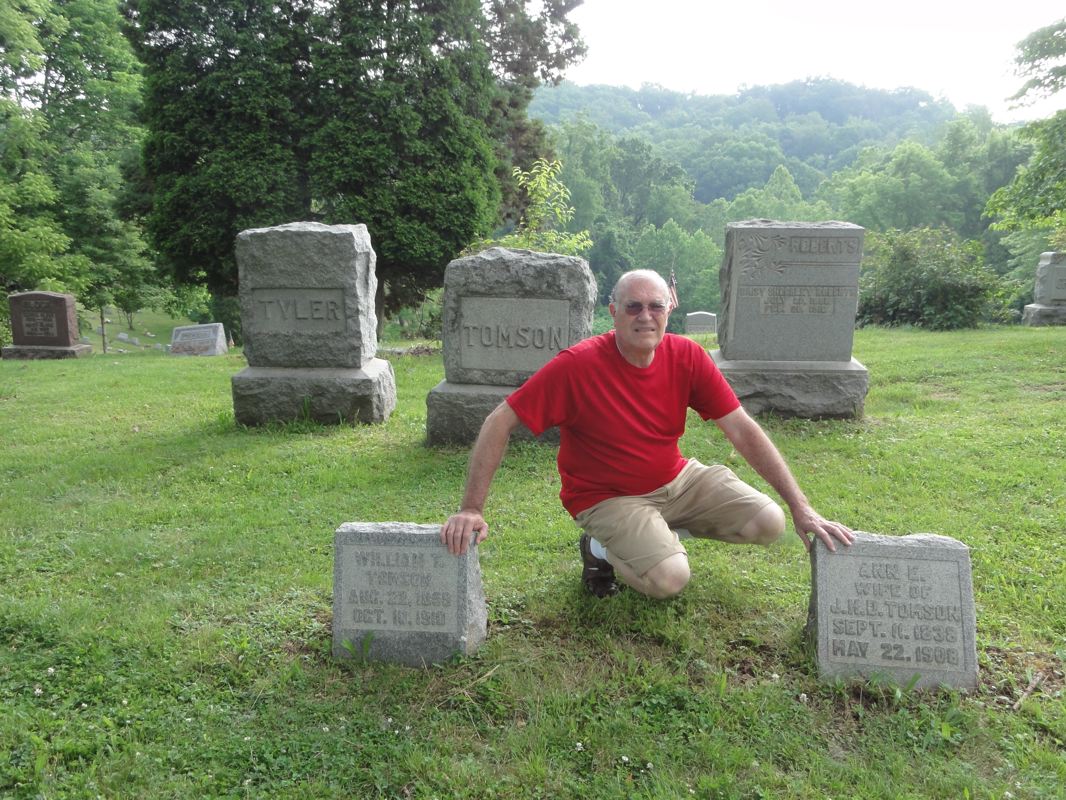
Tom L. Childers at the graves of J. H. D. Tomson and Family
Tom is the preacher at New Hope Church of Christ in Hardeman County, Tennessee
where the Tomson/Thompson family lived and worked for generations. It is one of
the oldest churches in West Tennessee.

Scott Harp at the graves of J. H. D. Tomson and Family
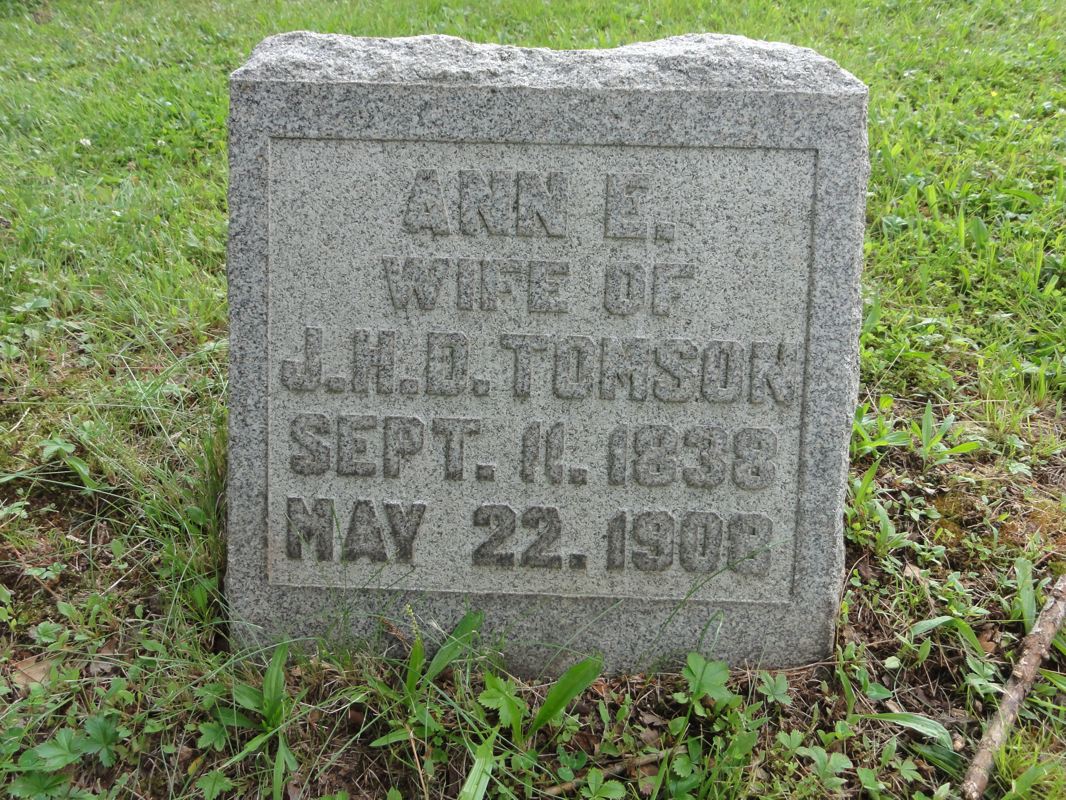
Ann E.
Wife of
J.H.D Tomson
September 11, 1838
May 22, 1908
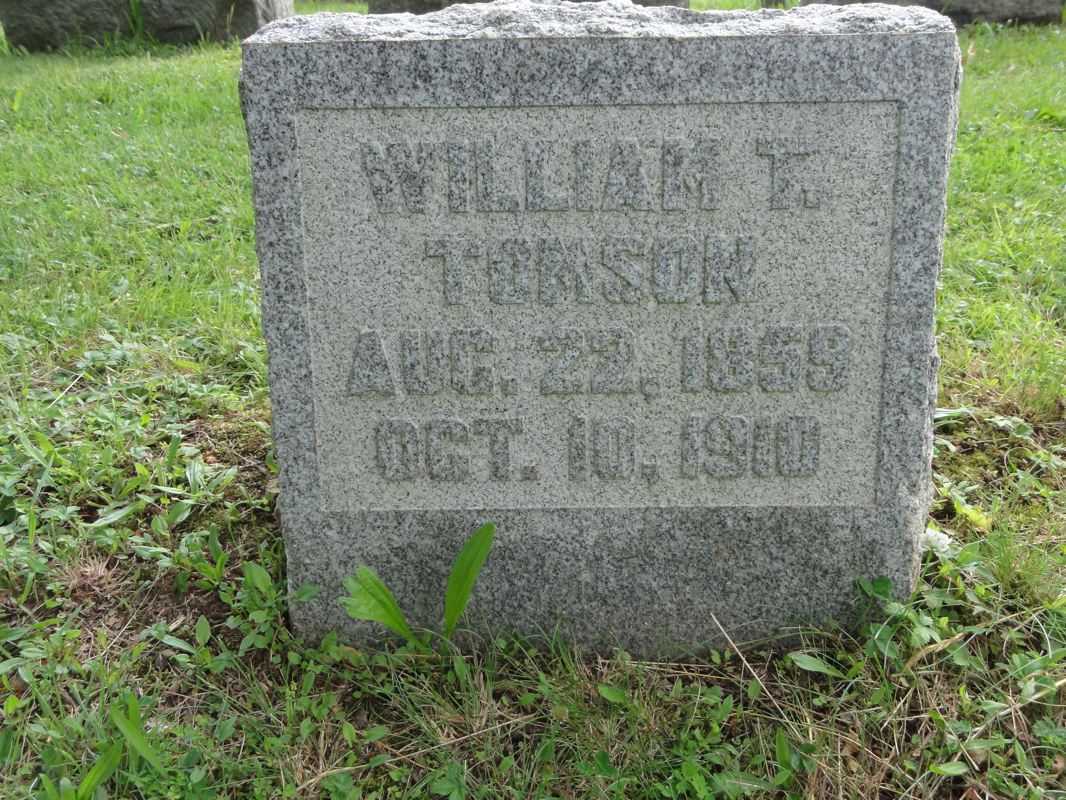
William Thomas Tomson
August 22, 1859
October 10, 1910
(See Obituary Above)
![]()
Photos Taken May 25, 2012
Courtesy of Scott Harp
www.TheRestorationMovement.com
The photos on this site were taken during a trip through six states to search for Restoration Movement sites. Tom L. Childers and your web editor, Scott Harp, visited the grave of J. H. D. Tomson on the final day of their journey heading back toward Tennessee and home on May 25, 2012.
![]()
